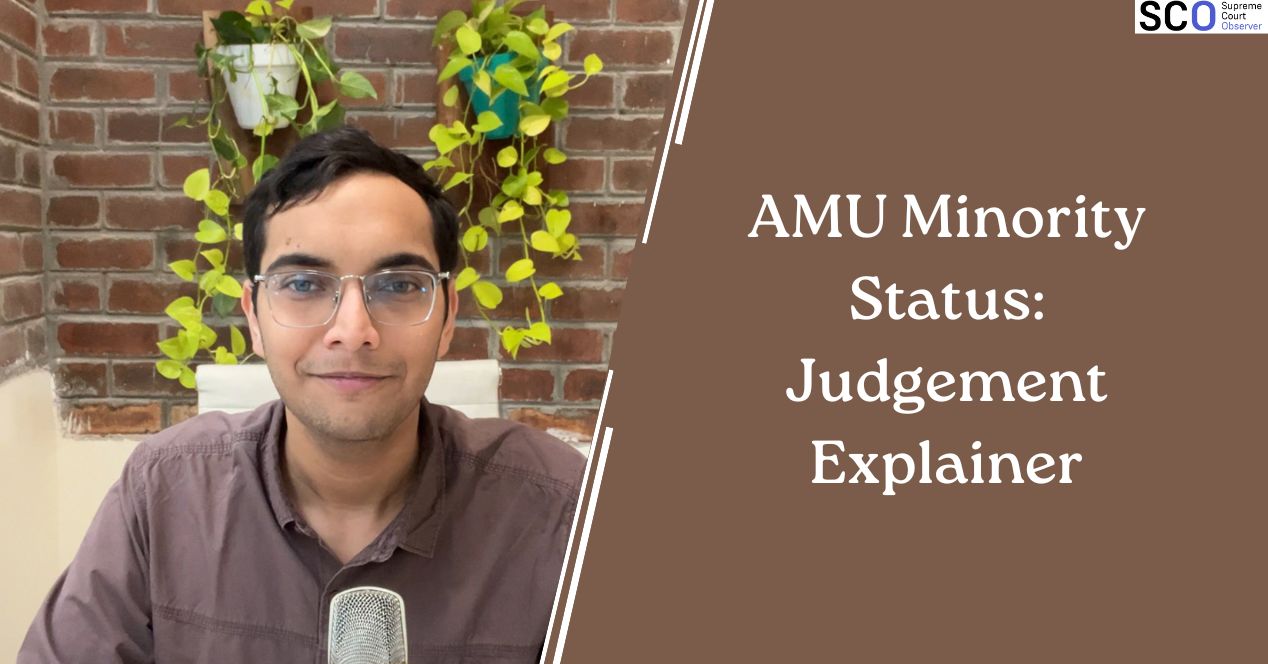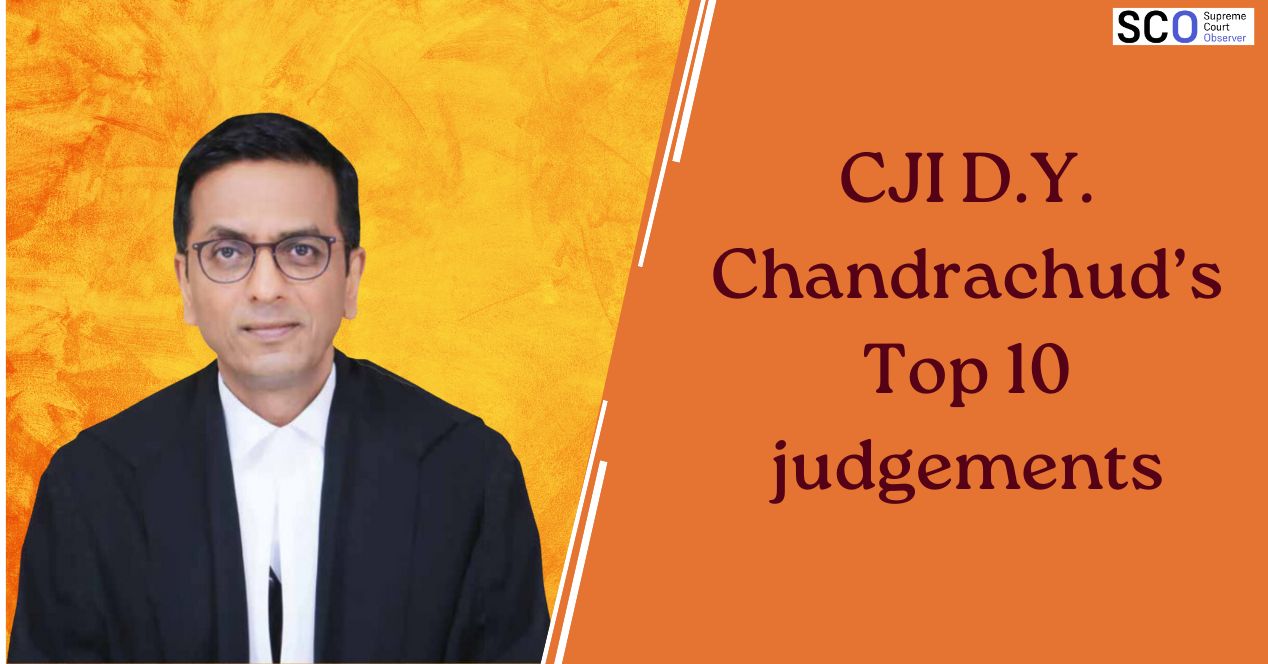Channel
Top 7 dissents by CJI DY Chandrachud
In this video, we curate a list of notable opinions wherein Justice Chandrachud deviated from the majority in his judgements and reasoning
Transcript:
Hello everyone and welcome to SCO’s channel! I’m Sai Spandana. Justice D.Y. Chandrachud retired as India’s 50th Chief Justice on 10th November. First elevated in 2016, his career of over eight years at the top court has seen some notable judgments. If you haven’t already do check out our video on his top 10 judgements. Notably, Justice Chandrachud has been almost always been in the majority while deciding cases during his tenure at the Supreme Court. But a thread can be discerned as running through the rare occasions where he has dissented. The opinions have attempted to articulate rights and emphasize the Constitution’s transformative character. Our court reporter Sushovan Patnaik has curated seven such instances when Justice Chandrachud was in the dissent. In this video, my colleague Advay Vora and I summarize all seven cases. Let’s dive right in!
In 1990, C.D. Commachen challenged the election of his rival Abhiram Singh from Mumbai’s Santa Cruz constituency on the ground that Singh made communal remarks in the run up to the elections. It sparked a 25 year long litigation that finally concluded with a seven judge bench decision in 2017. By a 4:3 majority, the court held that appealing to voters on the basis of his religion, race, caste, community or language of either the candidate or the voter was a corrupt practice under the Representation of Peoples Act 1951. Justice Chandrachud wrote a 55 page dissent. He held that Parliament intended to impose a bar on using ascriptive identities only to candidates. Otherwise a candidate would be unable to speak about the injustices suffered by a segment of the population on the basis of their identity.
In November 2012, retired judge K.S. Puttaswamy filed a challenge against the scheme of the Aadhaar card which had become the primary document to access many government welfare schemes. Almost six years later, a five judge bench of the Supreme Court in a 4:1 majority held that the Aadhaar was constitutional. Justice Chandrachud’s dissent ran into 481 pages. He noted that participation in large scale biometric systems such as the Aadhaar should be based on informed consent of the citizens. In his view, the Aadhaar act was not only silent on informed consent, but Section 28(5) actively prevented citizens from accessing their own data, thereby violating their right to privacy.
In August 2018, five activists were arrested by the Maharashtra Police on the ground that they incited caste based riots on the sidelines of the Elgar Parishad event held earlier that year. A day after the arrest, five citizens filed a joint petition in the Supreme Court challenging the arrest and demanding the formation of a Special Investigation Team to monitor the Maharashtra Police’s investigation and conduct an independent inquiry. In September 2018, a three judge bench of the Court in a 2:1 majority concluded that the accused were not entitled to demand a specific mode of investigation. But Justice Chandrachud’s 43 page dissent took a different view. He observed that a police investigation suffered from infirmities, one of which was the decision to approach the media while the investigation was underway and ruled in favour of the SIT probe.
In a landmark ruling in 2018, a five judge Constitution Bench led by then Chief Justice Dipak Misra held that prohibition of women in their menstruating years from entering the Sabarimala temple in Kerala was unconstitutional. While Justice Indu Malhotra’s dissent was resounding, Justice Chandrachud concurring opinion also raised a divergent view. Though Justice Chandrachud agreed with the majority, he found their reliance on the Essential Religious Practices doctrine problematic. He held that the Court cannot consider itself an authority to determine practices which are essential or inessential to a religion.
In November 2009, the Central Information Commission ordered the Supreme Court to disclose certain correspondence between the Collegium and the government in furtherance of a request under the Right to Information Act 2005. The Court appealed the order. In 2019, a five judge Constitution Bench ruled that judicial independence was not contradicted by the need for transparency. While Justice Chandrachud signed the majority opinion of Justice Sanjiv Khanna, his 112 page long concurring opinion, which was longer than Justice Khanna’s majority opinion, had some additional observations. While all judges agreed that information cannot be curtailed simply because it hampers the free and frank expression of constitutional functionaries, Justice Chandrachud went further to hold that selection criteria for judicial appointments must be clearly defined and placed in the public realm.
After the Aadhaar judgment was delivered in 2018, seven parties filed review petitions in the Supreme Court arguing that the decision suffered from errors apparent on the face of record. A five judge bench heard the case in chambers and dismissed the petition in a 4:1 majority. Justice Chandrachud, who was part of the original Aadhaar case, dissented. He noted that a bench of equal strength had doubted the 2018 judgement’s reasoning so the review should not be dismissed at this stage because a larger bench was considering the question.
In October 2023, a five judge bench held that there was no fundamental right to marry for sexual minorities. The Court also refused to recognise the rights of LGBTQIA+ persons under the Special Marriage Act. While the decision was unanimous, Chief Justice Chandrachud’s 247 page part dissent raised some crucial issues. Firstly, he disagreed with Justice Bhat’s majority holding that the Supreme Court was not the right forum to approach to recognize queer person’s right to marry. Second, he and Justice S.K. Kaul also diverged from the others by noting that sexual minorities have the right to enter into a civil union and it flows from Article 19. Finally, CJI Chandrachud diverged from the majority while holding the non heterosexual unmarried couples can also adopt children.
This brings us to the end of our video. What do you think about Justice Chandrachud’s tenure and his judgements? Did we miss any cases? Do tell us in the comments below. For this and many more assessments of Justice Chandrachud’s tenure visit SCObserver.in! Thank you for watching and as always we’ll see you soon.




